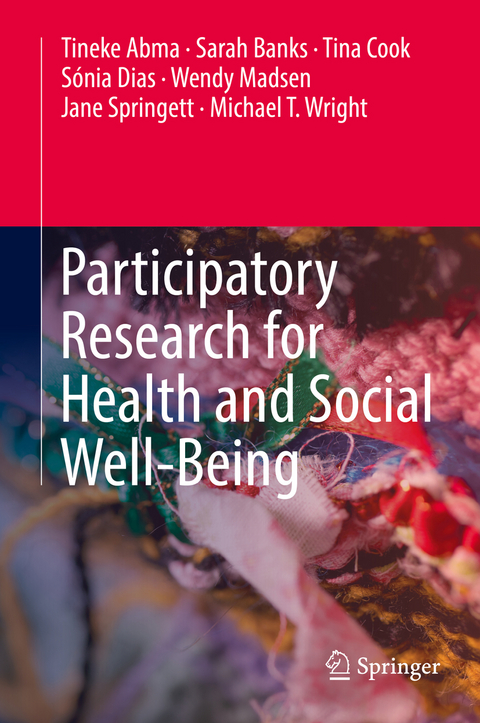
Participatory Research for Health and Social Well-Being
Springer International Publishing (Verlag)
978-3-319-93190-6 (ISBN)
Prof. dr. T.A. Abma is Full Professor ‘Participation & Diversity’ and Co-Head of the department of Medical Humanities at the VU University medical center and research leader in the Amsterdam Public Health institute, in Amsterdam, The Netherlands. Formerly she was an Endowed Chair in the field of ‘Client participation in Elderly care.’ In 2013 she received an ASPASIA laureate from the Dutch Council for Scientific Research (NWO). Her work is grounded in the interactive and responsive evaluation and empirical ethics. She has been involved in long-term projects in the field of psychiatry, elderly and chronic care, and her work has been awarded for its high societal impact. Abma is author/editor of a number of books, including Evaluation and Narrative (JAI Press, 1999) and Evaluation for a Caring Society (IAP Press, 2018).Prof. dr. Sarah Banks is Professor of Applied Social Sciences in the Department of Sociology and Co-director of the Centre for Social Justice and Community Action, Durham University, UK. She teaches and researches in the fields of professional ethics, community development and community-based participatory research. She has been involved in developing guidelines and case materials on ethics in participatory research, and is author/editor of a number of books on professional ethics, youth work and community development, including Critical Community Practice (2007, The Policy Press); and Managing Community Practice (2nd edn, 2013, The Policy Press).Prof. dr. Tina Cook is Professor of Education at Liverpool Hope University. At the core of her work is a focus on inclusive practice in research and evaluation. She teaches research approaches to students and community partners and has published on methodological issues in participatory research and its impact. She is an Executive Committee Member of the ICPHR, an Editor of the International Journal of Educational Action Research and a founder member of the UK Participatory Research Network. Her own research focus is with people with learning disability and people with cognitive impairment.Dr. Sónia Dias is Associate Professor at the International Public Health Unit of the Instituteof Hygiene and Tropical Medicine, Universidade NOVA Lisboa. She teaches postgraduate courses and supervises PhD and masters students in the field of health promotion, health education and disease prevention. She is currently the coordinator of the Health Challenges of Migrants’ research line at the Global Health and Tropical Medicine Research Centre and coordinates the PhD in International Health. She has been involved in international research concerning Sexual and Reproductive health (mainly HIV prevention and sexual behaviors), health of vulnerable groups, access to healthcare services and migrants’ health. She acts as a consultant for several international organizations. Dr. W. Madsen is a Senior Lecturer in Health Promotion (CQ University, Australia). She teaches undergraduate health promotion courses and supervisors postgraduate research, including participatory research. While much of her research has focused on the history of public health, she has been increasingly incorporating the use of participatory approaches in historical research and exploring how history and the humanities contribute to healthy communities and community resilience.Prof. dr. Jane Springett is professor and former Director of the Centre for Health Promotion Studies at the University of Alberta, Canada. She has been involved in participatory research and evaluation for over twenty five years. She currently teaches participatory research within the graduate programs at the University of Alberta, School of Public Health and has published extensively in the field of health promotion on participatory evaluation. She is co-author with Emeritus Professor Margaret Ledwith of Participatory Practice , Community based action for transformative change ( 2010) published by Policy Press. She has coached over 20 PhD students.Prof. Dr. Michael T. Wright, LICSW, MS, has been involved in community-based health initiatives since 1984 in the United States and Germany. He is trained in public health (Harvard University). Wright was formerly the Director of International Relations at the Deutsche AIDS-Hilfe, and coordinator for the research areas HIV/AIDS and participatory research at the Social Science Research Center Berlin (WZB). He is currently Professor for Research Methods at the Catholic University of Applied Sciences Berlin and heads the central office of both the German and the International Collaboration for Participatory Health Research. In addition, he coordinates PartKommPlus, a national research consortium applying PHR in German municipalities.
Chapter 1. Making the Case: The Arguments for Participatory Research.- Chapter 2. Framing: The Search for a Lens of Understanding.- Chapter 3. Getting Started: The Initiation of a Partnership.- Chapter 4. Shaping: The Co-creation of a Research Design.- Chapter 5. Organizing: Making Plans Together.- Chapter 6. Acting for Change: The Generation of Transformative Action.- Chapter 7. Engaging: The Choice and Use of Participatory Methods.- Chapter 8. Sense Making: The Process of Data Analysis and Interpretation.- Chapter 9. Telling and Showing: The Shared Decisions About Dissemination.- Chapter 10. Capturing and Reflecting for Change: The Generation of Impact.- Chapter 11. Continuing the Journey: The Quest for Sustainable Partnerships.- Chapter 12. Epilogue: Bringing the Threads Together.
"The intended audience is undergraduate and postgraduate students, doctoral researchers, academics, and practitioners in the health and social sciences. ... it is laid out nicely and chapters are very clearly defined." (Julie K Weibel, Doody's Book Reviews, July 05, 2019)
“The intended audience is undergraduate and postgraduate students, doctoral researchers, academics, and practitioners in the health and social sciences. … it is laid out nicely and chapters are very clearly defined.” (Julie K Weibel, Doody's Book Reviews, July 05, 2019)
| Erscheinungsdatum | 05.12.2018 |
|---|---|
| Zusatzinfo | XXXIII, 249 p. 75 illus. |
| Verlagsort | Cham |
| Sprache | englisch |
| Maße | 155 x 235 mm |
| Gewicht | 583 g |
| Themenwelt | Medizin / Pharmazie ► Pflege |
| Studium ► Querschnittsbereiche ► Prävention / Gesundheitsförderung | |
| Sozialwissenschaften ► Soziologie ► Empirische Sozialforschung | |
| Schlagworte | Comprehensive Approach of Participatory Research • Comprehensive Approach of PHR • health and social welfare • health promotion and prevention • HIV/ AIDS Prevention • Improving Health and Well-Being • participatory action research • Participatory Health Promotion and Prevention • Participatory Health Research • Participatory Principles and Methods • Participatory Research and Building Relationships • Participatory Research for Health and Well-Being • PHR and Building Relationships • Quality Development in Health Promotion • Social Change and Impact • Social Movement • Sustainability of Participatory Health Research • Sustainability of Participatory Research |
| ISBN-10 | 3-319-93190-3 / 3319931903 |
| ISBN-13 | 978-3-319-93190-6 / 9783319931906 |
| Zustand | Neuware |
| Haben Sie eine Frage zum Produkt? |
aus dem Bereich


